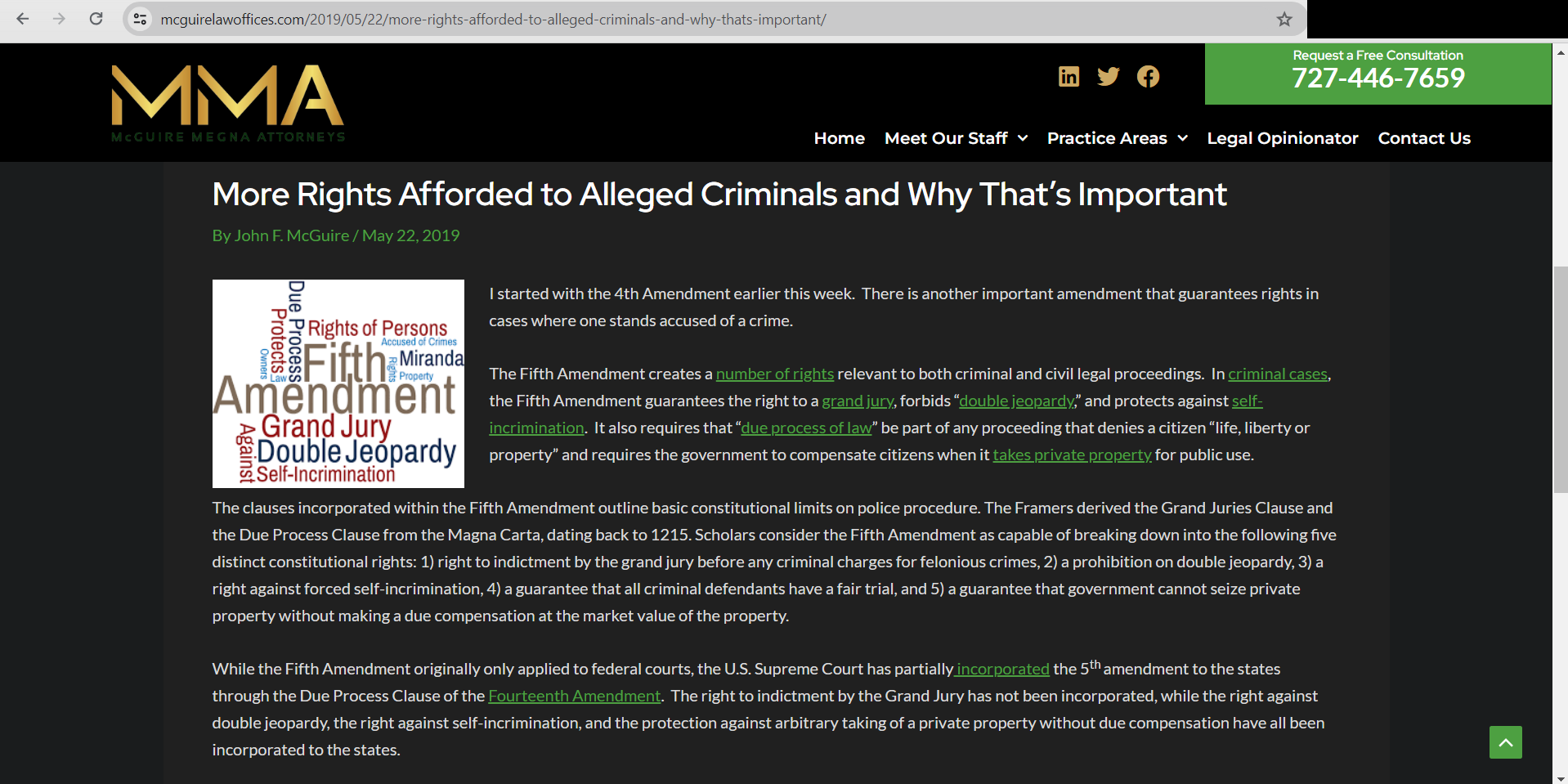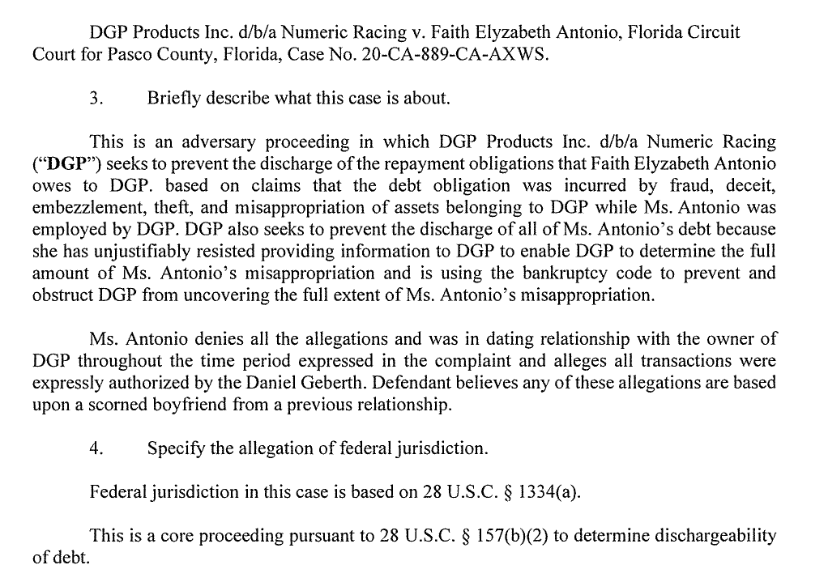Could You Be Unknowingly Paying Your Own Attorneys To Aid In Framing You For A Crime? I Believe I Did.
The relationship between a client and their attorney is one of trust, confidentiality, and legal protection. However, in rare and ethically murky situations, this relationship can take an unexpected turn, leading to scenarios where a client may inadvertently fund their own legal counsel to assist in the commission of a crime. It’s essential to grasp the fundamental tenets of the attorney-client relationship. Central to this relationship is the concept of confidentiality. Attorneys are bound by strict ethical guidelines and legal obligations to maintain client confidentiality, ensuring that any information shared by the client remains privileged and protected from disclosure. Furthermore, attorneys are duty-bound to act in the best interests of their clients, providing competent and diligent representation within the bounds of the law. This duty extends to advising clients on the legality of their actions and refraining from participating in any criminal endeavors.
Behind the guise of legitimate legal services, an attorney may become entangled in criminal schemes, using their expertise to navigate legal loopholes or provide counsel on evading detection. Here is a clear example of the continuation of the proceedings by my own attorneys, who I trusted but refused to communicate with me or protect me:

Now, the stay is in effect with respect to litigation in the state court.
Unless Mr. Megna will agree and consent to treating that discovery as if it was made in this adversary proceeding and is subject to my jurisdiction, I can't really touch it.

Attorneys Gino Megna and John McGuire had the duty and responsibility to their client to address the misconduct occuring in the Pasco County State Court, including setting the pending Motion to Dismiss and Sanctions for hearing. Instead they continued the psychological torment and financial abuse by forum shopping directly to McEwen’s court while demanding payment from the Antonio family, a continuation of conduct by attorney Brendan Riley.
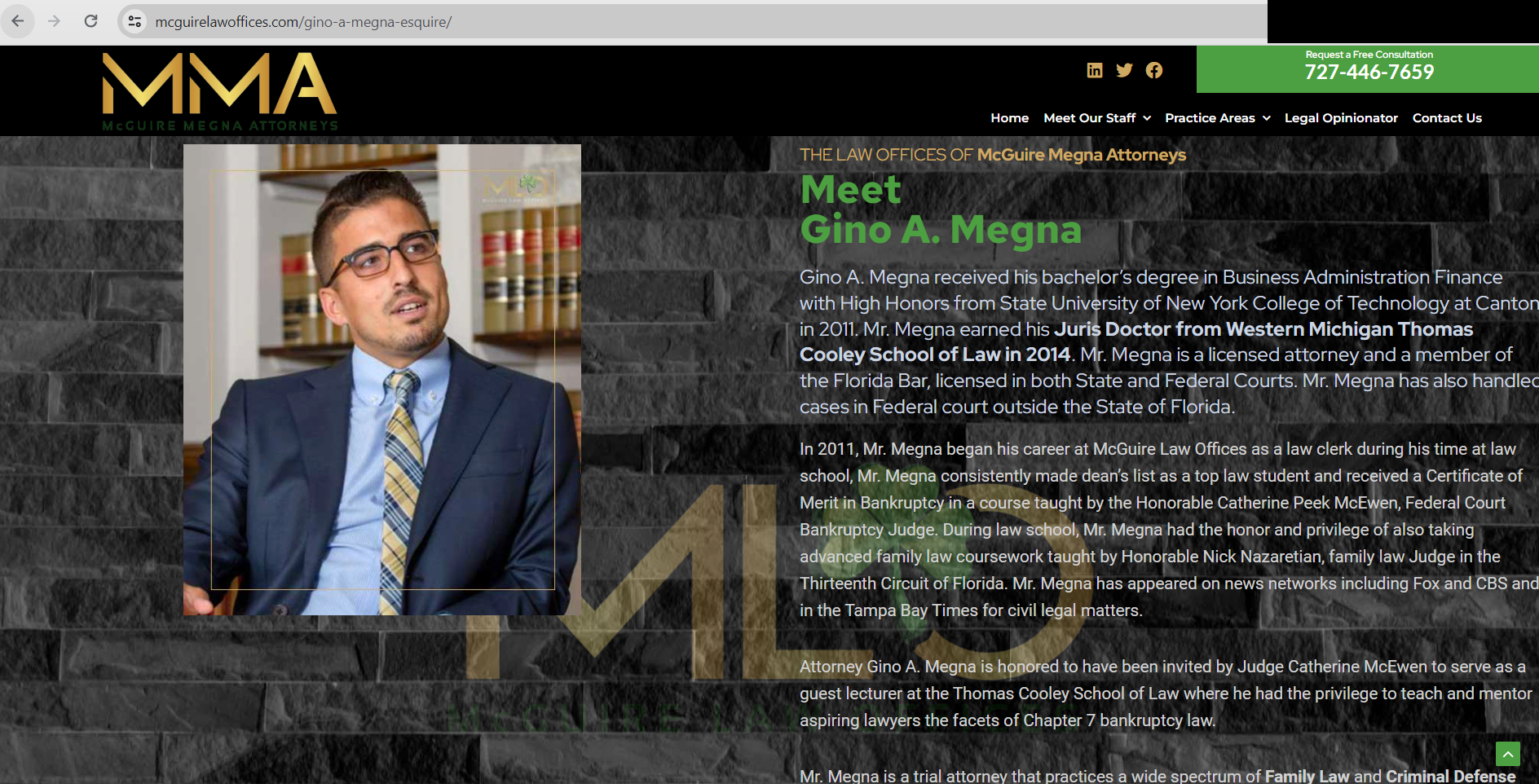
“Mr. Megna consistently made dean’s list as a top law student and received a Certificate of Merit in Bankruptcy in a course taught by the Honorable Catherine Peek McEwen, Federal Court Bankruptcy Judge.”
“Attorney Gino A. Megna is honored to have been invited by Judge Catherine McEwen to serve as a guest lecturer at the Thomas Cooley School of Law where he had the privilege to teach and mentor aspiring lawywers the facets of Chapter 7 bankruptcy law.”
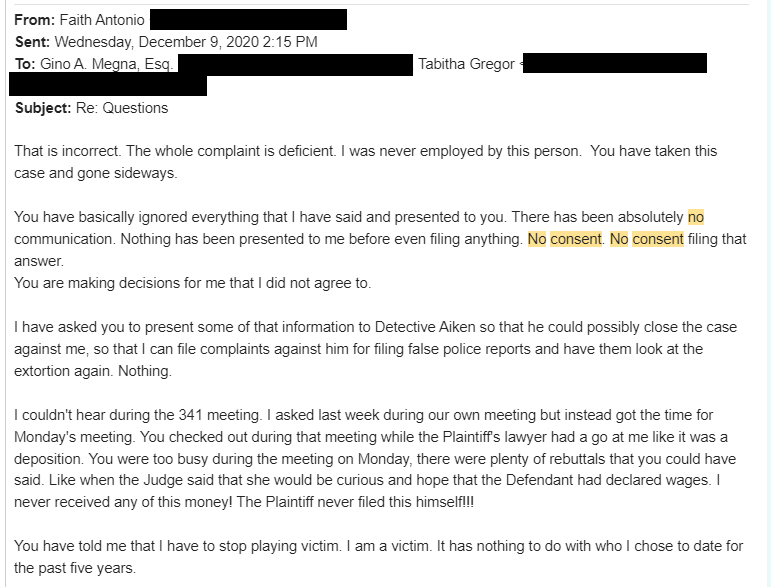
And he says that the lawyers are officers of the court in that regard."

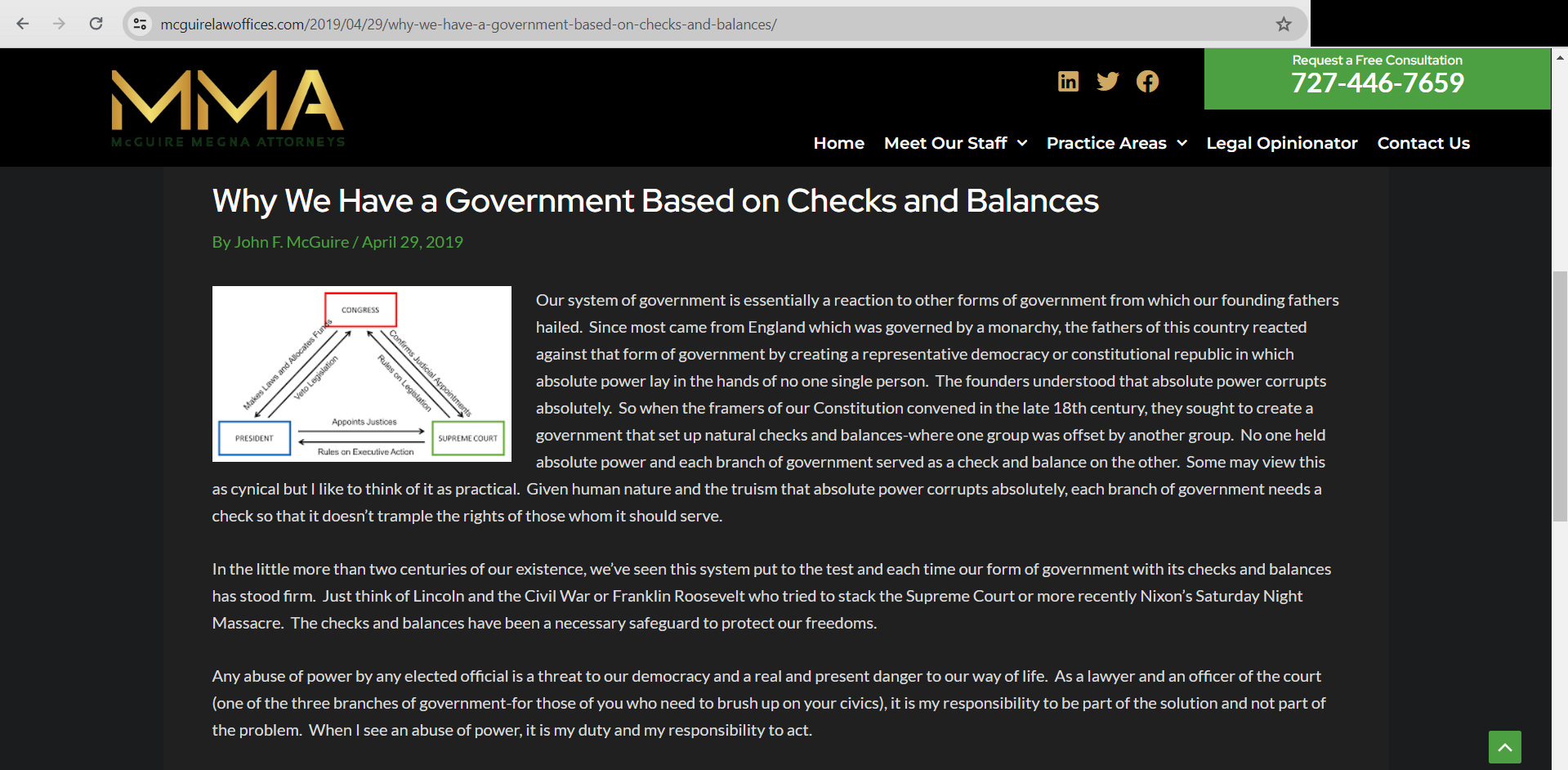
Attorney Gino Megna did not remove the State Court case to the Middle District Court, nor did an Article III Judge refer the case to Bankruptcy Jurisdiction. An attorney who advertises the ability to “teach and mentor… bankruptcy law would have the requisite knowledge that he was harming his client, ignoring the active domestic violence injunction, violating his clients constitutional rights. This done after he heard the voicemail by Geberth guaranteeing to fuck me over, while stating he knew I couldn’t afford attorney fees.
“We had the long talk in my office about providing information and let them go on a fishing expedition spend the money and we do a confidentiality agreement. If there is some stuff that is not relevant, we can object down the road that it doesn’t get in at trial.”
“Are you on board with the confidentiality agreement? I think that is our best route.”
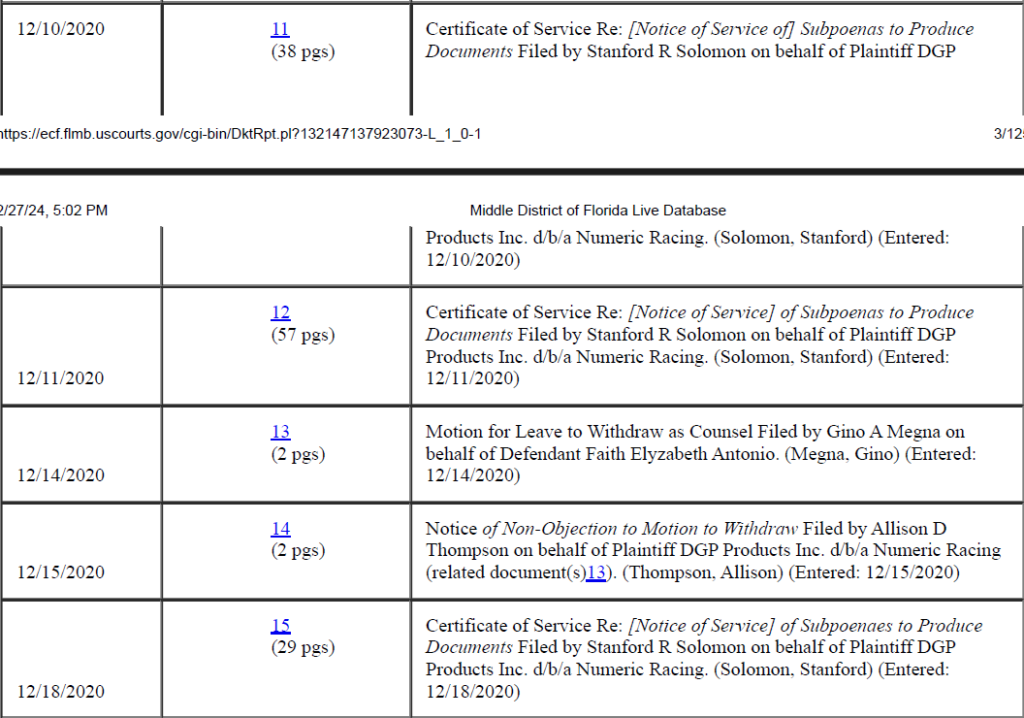

The Demand Letter specifically states the DGP/Geberth had the evidence to support its claims so it would be unnecessary to conduct any discovery
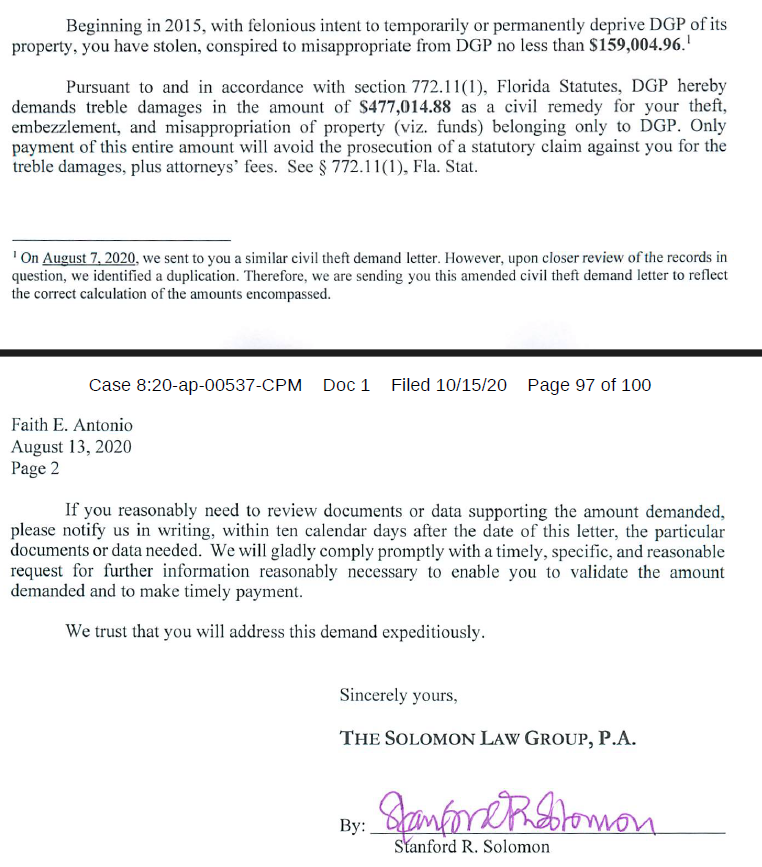

It is believed The Agreed Order that was done without communication and without my consent permitted the attorneys a means to use the subpoena process to obtain unrestricted and undisclosed access into members of the Antonio families private affairs. This is a corporation alleging an employment relationship violating privacy laws, including Gramm – Leach Bliley Act, HIPAA. Further questions why a Defendants attorney would permit this to occur to their client? Including waiving First Amendment Rights in a one-sided proposed agreement that Judge McEwen and attorneys repeatedly attempted to coerce me to sign that includes submitting to the jurisdiction of the U.S. District Court when the District Court never had the ability to retain jurisdiction.
Proposed Confidentiality Agreement for Bankruptcy Proceedings

“DGP seeks to prevent the discharge of the repayment obligations that Faith Elyzabeth Antonio OWES TO DGP… DGP also seeks to prevent the discharge of all of Ms. Antonio’s debt because she has unjustifiably resisted providing information to DGP.” Especially while stating, “Ms. Antonio denies all the allegations and was in dating relationship with the owner of DGP… Defendant believes any of these allegations are based upon a scorned boyfriend.” What attorney would allow this type of language when they know of its falsity and why would a judge ignore the flagrant abuses?
@poetic.injustice #duet with @Not Your Average Advocate 👑💜 #survivorstrong #greenscreen #awareness #legal #abuse ♬ original sound - Not Your Average Advocate 👑💜
The notion of a client unknowingly paying their own attorney to assist in a crime raises significant legal and ethical concerns. From a legal standpoint, attorneys who knowingly aid or abet criminal activity can face severe consequences, including disbarment, criminal charges, and civil liability. Even if the attorney is unaware of the client’s illicit intentions, their involvement in facilitating criminal conduct can still result in professional sanctions and reputational damage. Ethically, attorneys are expected to uphold the highest standards of integrity and morality in their practice. While the attorney-client privilege shields confidential communications between clients and their attorneys, it does not provide carte blanche for attorneys to engage in or condone criminal behavior.
